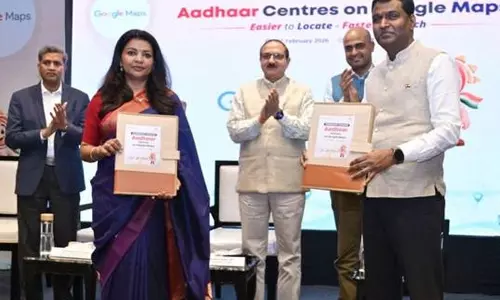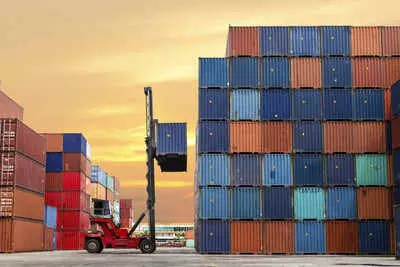
India announces "dynamic" foreign trade strategy; targets $2 trillion in exports by 2030
text_fieldsNew Delhi: With the goal of increasing exports to USD 2 trillion by 2030, making the Indian Rupee a worldwide currency, and encouraging e-commerce exports, India released a "dynamic and responsive" foreign trade policy on Friday.
The strategy of the Foreign Trade Policy (FTP) 2023 is to transition from an incentive-based system to one based on remission, promote cooperation between exporters, states, districts, and Indian Missions, lower transaction costs, and create more export centres.
India is likely to cross USD 765 billion in merchandise and services exports in the financial year 2022-23 which ends on Friday. The total exports were USD 676 billion in the previous fiscal year.
Unlike the practice of 5-year FTPs, this time the government has come out with a dynamic and responsive trade policy without any end date and will be updated as per the emerging global scenario.
"We have ensured there is no end date to this policy, it will be updated from time to time," said Director General of Foreign Trade (DGFT) Santosh Sarangi while briefing media on the salient features of FTP 2023 unveiled by Commerce and Industry Minister Piyush Goyal.
Goyal said the Department of Commerce will be making a massive focused outreach to the world, either sectorally or country-wise, over the next 4-5 months. Ministry of External Affairs and Indian Missions abroad will work with the department.
"We have to meet our exports targets going forward. We will achieve USD 2 trillion in exports by 2030, but it should not be that merchandise exports are outperformed by services exports," the minister said.
The DGFT said India is likely to cross USD 765 billion in merchandise and services exports in the financial year 2022-23 which ends on Friday. In 2021-22, the total exports were USD 676 billion.
The FTP aims at the internationalisation of trade in the Indian Rupee. It allows international trade settlement in INR and required changes have been introduced for the grant of export benefits and fulfilment of Export Obligation (EO) for export realisations in the domestic currency as per RBI.
"If there are countries where there is currency failure or dollar shortage we are willing to trade in the rupee with them," said Commerce Secretary Sunil Barthwal.
He also stressed that Indian exporters will have to become globally competitive and need not depend on subsidies.
In the interest of trade and industry and to motivate exporters, the FTP provides relief to exporters who are unable to fulfil their EO against the Export Promotion Capital Goods (EPCG) scheme and Advance Authorisations.
It introduces an amnesty scheme for one-time settlement of default in export obligation by Advance Authorisation and EPCG authorisation holders.
As per the scheme, all pending cases of default in meeting EO can be regularised on payment of customs duties that were exempted and interest at the rate of 100 per cent of the duties exempted.
The FTP aims to streamline policy for the export of dual-use items under Special Chemicals, Organisms, Materials, Equipment and Technologies (SCOMET).
SCOMET policy emphasises India's export control in line with its international commitments under various export control regimes (Wassenaar arrangement, Australia Group and Missile Technology Control Regime) to control trade in sensitive/dual-use items/technology.
It also focuses on simplifying policies to facilitate the export of dual-use high-end goods/technology such as UAVs/drones, cryogenic tanks, and certain chemicals.
The FTP 2023 focuses on engaging with states and districts through the Districts as Export Hubs initiative by identification of products and services in each district; institutional mechanisms; and preparation of district export action plans, among others.
The policy specifically extends FTP benefits to e-commerce exports which are estimated to grow to USD 200-300 billion by 2030.
To streamline e-commerce export facilitation, guidelines are being formulated in consultation with other ministries.
Also, there will be special outreach and training activities for small e-commerce exporters.
Battery Electric Vehicles (BEV) of all types, vertical farming equipment, wastewater treatment and recycling, rainwater harvesting system and rainwater filters, and green hydrogen have been added to green technology products, thus making them eligible for reduced Export Obligation requirement under the EPCG scheme.
Another key highlight of the policy is that a special Advance Authorisation scheme has been extended for the apparel and clothing sector to facilitate prompt execution of export orders.
The dairy sector too has been exempted from maintaining average EO. The move will provide support to the sector to upgrade the technology.
Faridabad, Moradabad, Mirzapur and Varanasi have been declared as Towns of Export Excellence (TEE) with an aim to give thrust to cluster-based economic development. Currently, there are 39 TEEs.
The policy, which comes against the backdrop of global uncertainties, outlines measures for merchanting trade under which a trader can buy from one country and supplies to another country while based in India.
Further, the export performance threshold for recognition to exporters through Status Holders has been relaxed. Under the new norms, the threshold for obtaining Star House status has been reduced significantly.
Digitisation of applications pertaining to FTP and automatic system-based approvals are among the other key initiatives announced in the policy.
On a pilot basis, the FTP has introduced processing of Advance Authorisation extension/revalidation applications in a single day, which currently takes three days to one month.
The DGFT said policy changes have been done since 2015 even without the announcement of a new FTP.
The schemes sanctioned under the policy will be honoured for the tenure for which they are sanctioned even if the schemes are foreclosed.
The Foreign Trade Policy 2015-20, which was to end on March 31, 2020, was extended several times due to the pandemic and volatile geopolitical scenario. The last extension was till March 31, 2023 (Friday).
With PTI inputs






















